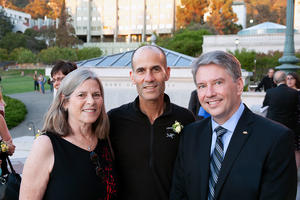- « first View: Taxonomy term
- ‹ previous View: Taxonomy term
- …
- 38 of 58 View: Taxonomy term
- 39 of 58 View: Taxonomy term
- 40 of 58 View: Taxonomy term
- 41 of 58 View: Taxonomy term
- 42 of 58 View: Taxonomy term (Current page)
- 43 of 58 View: Taxonomy term
- 44 of 58 View: Taxonomy term
- 45 of 58 View: Taxonomy term
- 46 of 58 View: Taxonomy term
- …
- next › View: Taxonomy term
- last » View: Taxonomy term


 How can the makers of Goretex produce waterproof gear without toxic perfluorinated chemicals? How might an enzyme found in plants and fungi help Levi Strauss & Co. keep their brand of khakis wrinkle-free? Is it possible to make an effective sunscreen that doesn’t damage coral reefs? A novel collaboration between the School of Public Health and the College of Chemistry through the Berkeley Center for Green Chemistry (BCGC) is leading the nation in reimagining chemistry education to reduce waste, develop safer chemicals, and achieve sustainability.
How can the makers of Goretex produce waterproof gear without toxic perfluorinated chemicals? How might an enzyme found in plants and fungi help Levi Strauss & Co. keep their brand of khakis wrinkle-free? Is it possible to make an effective sunscreen that doesn’t damage coral reefs? A novel collaboration between the School of Public Health and the College of Chemistry through the Berkeley Center for Green Chemistry (BCGC) is leading the nation in reimagining chemistry education to reduce waste, develop safer chemicals, and achieve sustainability.
 In the mid-1970s, Professor of Chemistry, Physics and, Molecular and Cell Biology Carlos J. Bustamante, left Peru to go to graduate school in the US. He intended to return, but political and economic turmoil prevented that. He wound up staying for a postdoc. He then joined the chemistry faculty at the University of California, Berkeley, where he works on single-molecule manipulation and detection.
In the mid-1970s, Professor of Chemistry, Physics and, Molecular and Cell Biology Carlos J. Bustamante, left Peru to go to graduate school in the US. He intended to return, but political and economic turmoil prevented that. He wound up staying for a postdoc. He then joined the chemistry faculty at the University of California, Berkeley, where he works on single-molecule manipulation and detection.




